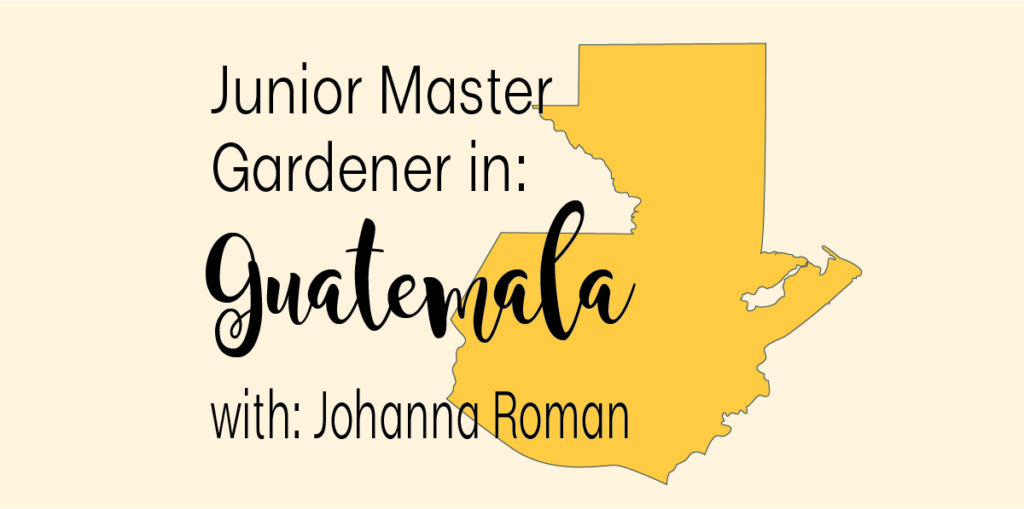
Junior Master Gardener (JMG) has impacted the lives of many across the country, and continues to grow across the world as it enters into Central America, specifically, Guatemala. Johanna Roman, a horticulturist who has worked for Texas A&M University, located in College Station, Texas, for over 15 years, first introduced JMG to Guatemala three years ago when she was managing development programs focused on horticulture in that country. Roman is now working at the Center on Conflict and Development at Texas A&M University (ConDev), and is leading a research program to study if JMG programs can be an effective tool to promote teamwork and inclusion, while reducing bullying in elementary schools in rural Guatemala.
JMG is clearly making a difference in the people of Guatemala’s livelihood. It all started when Roman was managing a project to train women how to create jams and jellies using fruits and vegetables while teaching them about food processing. Many of the women would bring their children and then, Roman had an idea.
“It got a little bit dangerous because [the moms] were working with knives and different tools,” Roman said, “so then I decided that I wanted to offer a program for kids while their moms were taking our workshops.”
Roman reached out to JMG Program Director Lisa Whittlesey, who sent her some of the program’s garden-based curricula. Eventually, the program grew so large in size that they began to send Texas A&M students as volunteers over to Guatemala to help conduct workshops for kids in rural schools and orphanages. Most recently, Learn! Grow! Eat! & Go! (LGEG) which is a ‘self-directed and engaging training course for teachers, volunteers and Extension that serves as a dynamic professional development opportunity’ has been introduced to the students as well.
“Now I have volunteers that are horticulture and gardening experts, even Master Gardeners, that for the past two years have been traveling with me. Since JMG programs started in Guatemala, I have offered opportunities to over 200 A&M students through the JMG program and perhaps about 50 adult volunteers.”
According to Edwin Price, Director of Center on Conflict and Development, the Texas A&M Garden club and Master Gardeners both play a key role in assisting in food security efforts in Guatemala. Price said that because of the range of concepts that the children in Guatemala are learning, ConDev also assists in providing alternative methods of food preparation and preservation.
“We studied a range of drivers of conflict in Guatemala, and were able to prepare guidance for USAID (United States Agency for International Development) in this area,” Price said. “In a subsequent study we learned that better nutrition has helps to reduce violent behaviors, and we have introduced better methods of food preservation.”
Along with the ConDev Center, JMG has been able to begin to make a positive impact on the lifestyle of those they educate. They are able to not only teach them about mass production of food, but personal produce as well home gardens.
“Our main audience are kids from impoverished neighborhoods [who] live under the poverty line,” Roman said. “Even though they live in an agricultural area, most of them know very little about producing their own food. Their diets are mainly rice beans and some squash, so it’s not very diverse, so they need access to nutrient dense vegetables.”
The incredible impact that JMG is making on those in Guatemala has not only shaped the people but also shifted aspects of their overall culture. Due to limited resources however, parts of the program are adapted to fit more comfortably in Guatemala compared to America.
“In Guatemalan indigenous communities, many girls stay at home and help their moms take care of the kids, [so] it’s great to see those girls out with a shovel growing their own food during our JMG workshops,” Roman said. “The LGEG program is already promoting inclusion of girls in activities that are traditionally for boys.”
Overall, the difference that JMG made on has proven to affect not only locals of Guatemala, but also those who have spent time serving and working closely with the program.
“The JMG program is a great way for U.S. volunteers to interact with Guatemalan kids through fun games and activities,” Roman said. “Kids are actually learning different horticulture and nutrition concepts, from soil science to plant needs to preparing healthy snacks. Now with the new LGEG curricula, we are also incorporating not only health and nutrition from the garden, but also the importance of being active. I am looking forwards to seeing JMG continue to bloom in Guatemala and start spreading seeds to other developing countries around the world.”


Recent Comments